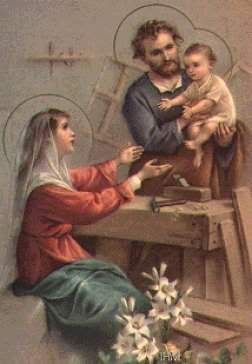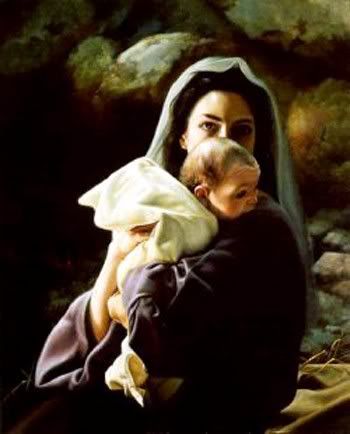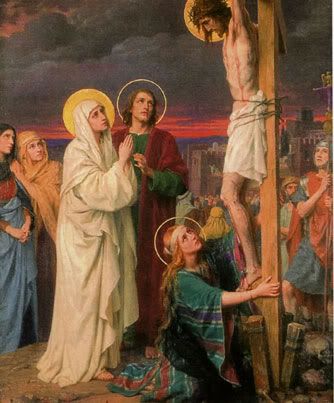Marian Mondays is a weekly post focusing on Our Blessed Mother, Mary, Queen of Heaven and Earth. In this post, we explore her life, her special mission, her sanctity, and the Biblical bases for the beliefs of the Church.
We pray with Mary. We experience her practically, emotionally, and rationally. We feel confident in the truth of her existence. We realize that she is unique, chosen for a special purpose by the Lord. We recognize the importance of her name. But what of her Christian virtues? We hold Mary, the Mother of God, up as the first disciple of Christ, as in her agreeing to serve as the vessel of the Incarnation, she became the first Christian. She believed in her Son. And as we will see, she lived His teachings, even before He taught them, such was her connection to the Lord. She exhibited fully the three theological virtues of faith, hope, and charity.
Last week, we briefly looked at the great faith of Our Blessed Mother, Mary. As we continue our preliminary exploration of the virtues of the Mother of God, we turn to hope, the consummated will of the Lord.
For we are saved by hope. But hope that is seen is not hope. For what a man seeth, why doth he hope for? But if we hope for that which we see not, we wait for it with patience (Romans, 8:24-25).
Hope and faith are intrinsically connected-- Faith being the belief in the power and presence of God, and hope being the confidence that the Lord can accomplish all things. We can have faith, but lose hope. And similarly, we can hope without great belief or faith. The world tempts us to both of these options, and this is likely the case for Mary, as well. Throughout the New Testament, we see numerous opportunities for doubt on the part of Mary, as well as opportunities for her to lose hope in the promise of God that she was called to. In each of these moments we sense her human suffering, her confusions, and her lack of complete understanding of the words of her Son:
Upon finding the child Jesus in the temple:
48When his parents saw him, they were astonished. His mother said to him, "Son, why have you treated us like this? Your father and I have been anxiously searching for you."
49"Why were you searching for me?" he asked. "Didn't you know I had to be in my Father's house?" 50But they did not understand what he was saying to them. (Luke 2:48-50)
At the Wedding in Cana:
"Woman, why do you involve me?" Jesus replied, "My time has not yet come." (John 2:4)
During His ministry:
31Then Jesus' mother and brothers arrived. Standing outside, they sent someone in to call him. 32A crowd was sitting around him, and they told him, "Your mother and brothers are outside looking for you."
33"Who are my mother and my brothers?" he asked.
34Then he looked at those seated in a circle around him and said, "Here are my mother and my brothers! 35Whoever does God's will is my brother and sister and mother." (Mark 3:33)
and
27As Jesus was saying these things, a woman in the crowd called out, "Blessed is the mother who gave you birth and nursed you."
28He replied, "Blessed rather are those who hear the word of God and obey it." (Luke 11:28)
These words directed from Son to mother, given a cursory glance, must seem harsh and even hurtful to Mary. We can imagine how we might respond if a family member of friend spoke to us in the same manner. And in those moments, that is when we look to Mary, as a model of virtue. Despite her human confusion at these events, at the words of Jesus, at the course her life had taken—Despite all of this, she never loses hope in the Lord. She comes back time and time again, placing her life, her meaning, and her purpose in the Lord, and doing so with confidence. Her hope never wanes—not during the childhood of Jesus, the start of His ministry, the Passion and crucifixion of Our Lord, not during the days He laid in the tomb. Mary’s continued journey with Jesus to His cross reveals a profound hope in the Resurrection, in the rebirth of all people through Jesus.
Why pray the Rosary every day for a year?
Each time the Blessed Virgin has appeared-- whether it be to Saint Bernadette Soubirous at Lourdes; to Lucia, Jacinta, and Francisco at Fatima; or to Mariette Beco at Banneux-- she has asserted the importance, saving grace, and power of praying the Holy Rosary on a daily basis. Based upon her words, the Rosary is penance and conversion for sinners, a pathway to peace, an end to war, and a powerful act of faith in Jesus Christ. Pope Paul VI presented the Rosary as a powerful means to reach Christ "not merely with Mary but indeed, insofar as this is possible to us, in the same way as Mary, who is certainly the one who thought about Him more than anyone else has ever done."
To show us how this is done, perhaps no one has been more eloquent than the great Cardinal Newman, who wrote: "The great power of the Rosary consists in the fact that it translates the Creed into Prayer. Of course, the Creed is already in a certain sense a prayer and a great act of homage towards God, but the Rosary brings us to meditate again on the great truth of His life and death, and brings this truth close to our hearts. Even Christians, although they know God, usually fear rather than love Him. The strength of the Rosary lies in the particular manner in which it considers these mysteries, since all our thinking about Christ is intertwined with the thought of His Mother, in the relations between Mother and Son; the Holy Family is presented to us, the home in which God lived His infinite love."
As Mary said at Fatima, "Jesus wants to use you to make Me known and loved. He wishes to establish the devotion to My Immaculate Heart throughout the world. I promise salvation to whoever embraces it; these souls will be dear to God, like flowers put by Me to adorn his throne."

Subscribe to:
Post Comments (Atom)









0 comments:
Post a Comment
Thanks for leaving a comment. If you wish to submit a prayer request, however, please do so above, using the "Contact" tab.